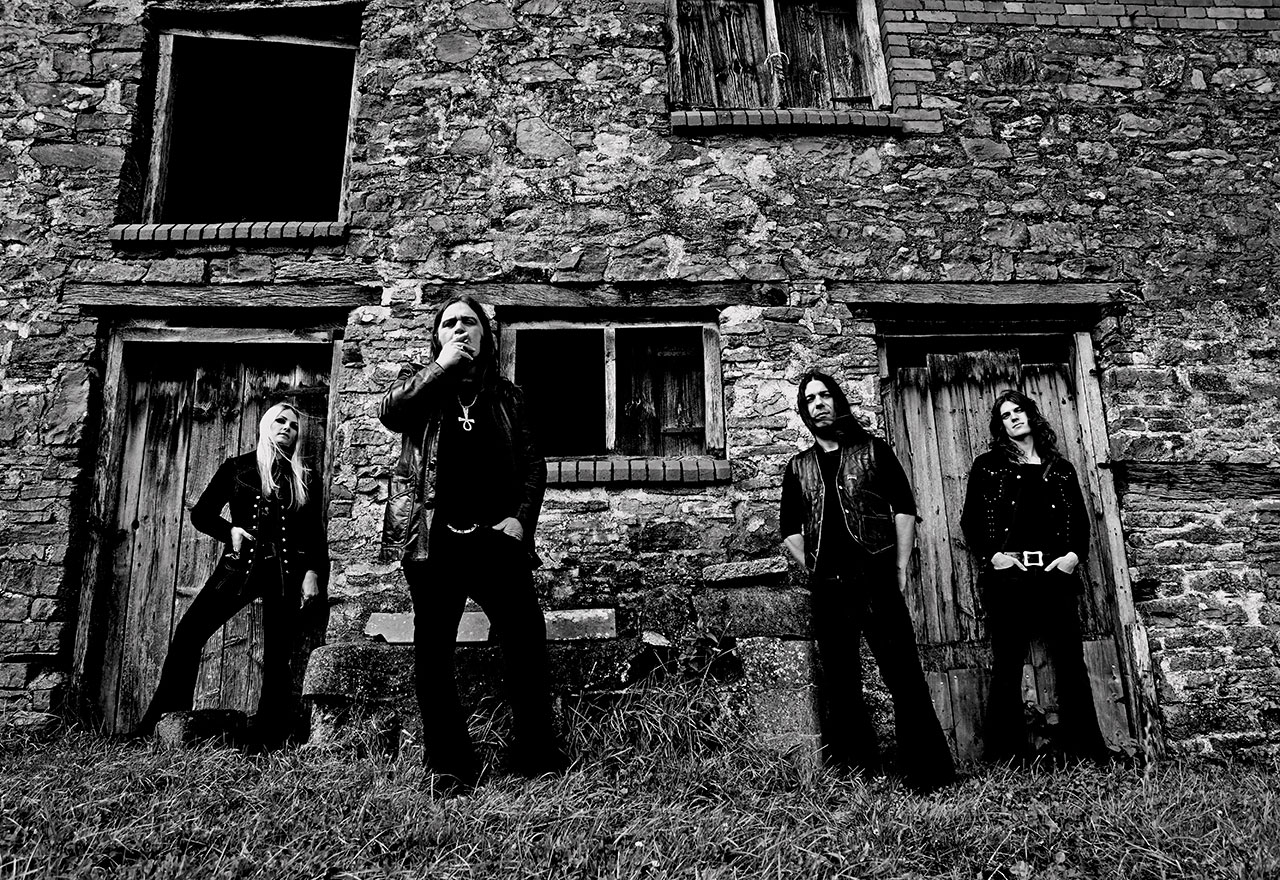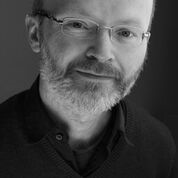If you’re off to see the Wizard, you’d better take a bloody good map. Despite marking a quarter of a century as the UK’s premier doom-metal band in 2018 – and releasing a ninth album, Wizard Bloody Wizard, which escapes the genre altogether to revel in classic Detroit sounds – Electric Wizard remain off the grid, underground.
The woman in the ticket office at Barnstaple station is knitting when CR’s train concludes its journey through autumnal Devon woodland and waterlogged fields. It’s the sort of place Holmes and Watson used to pull into, part of the “smiling and beautiful English countryside” Conan Doyle feared for its hidden, blood-red deeds. Then it’s a drive to the edge of a publess village, where the hedgerows close in as we rattle down a winding, rutted lane to a dead end. This is where Electric Wizard live.
All is still for a minute, under suddenly leaden skies. The Texas Chain Saw Massacre West Country remake vibe is both dispelled and enhanced when Justin Oborn opens his front door.
Oborn and Liz Buckingham, his American co-guitarist bandmate and wife since 2003, are both dressed in black (him in T-shirt with a flaking Dracula decal, her in a turtleneck and a silver amulet), with bell‑bottoms that suit the emporium of sleaze, horror, rock and erotica their rented farmhouse has become. They moved here from a similarly isolated, black-painted house where they made the grimly depressing, grinding 2014 album Time To Die. That record’s sampled satanic scare stories, although typical of straight-baiting Wizard antics such as 2012’s Legalise Drugs And Murder EP, sounded queasily believable for once. But this new HQ belongs to collectors, not a coven.
“She’ll blow your mind. She’s the girl with the power to turn you on! To turn you off!” a poster for The Virgin Witch promises in an upstairs hallway, while in the bathroom, Sexual Witchcraft’s poster has a woman spread-legged before a phallic black mass candle. Similar posters of stylishly and luridly nude women, from decadent Victorian Aubrey Beardsley illustrations to the 70s golden age of Euro exploitation cinema, fill the farmhouse walls, testament to Buckingham’s taste for the era’s shame-free erotica. An East Coast outsider with an English singer dad and dancer mum, she’s “liked weird stuff since I was a child”.
Oborn’s collections merge with hers, in cabinets full of LPs, DVDs, rock and film biographies, the Marquis de Sade and the Necronomicon. Stuffed black crows pose in flight, a carved monkey grins, a grandmother clock ticks, and a human skull sits on crossed human leg bones, on which former Wizard drummer Shaun Rutter once beat out tribal rhythms. The kitchen favours belladonna, hemlock and cyanide cellars over salt and pepper. But an exercise bike hints at just how normally, tastefully appointed the Wizard house is beneath its vintage veneer of flesh and bones.
Satyr IX Recording Studio, where Wizard Bloody Wizard was recorded, is a regular room with barely enough space for its analogue tape reel and Simon Poole’s drum kit. Full-time drummer in Electric Wizard’s ever-evolving line-up since 2014, the grey-bearded Poole also lives up a narrow lane, in a Cornish home with, he says, “similar” decor.
This dead-end house “appeals to me perfectly”, Oborn says. “I have been disappointed by a lot of people, and you end up burning bridges along the way. I’ve always liked the romantic idea of living under the radar. Like dune buggies with machine‑guns on,” he smiles, referencing Neil Young’s Charles Manson ode Ambulance Blues. “That’s what we’re working on.”
It’s quite an American attitude, to demand the right to be left alone to do their own thing. “Yeah. I’ve shown him – let’s go do it,” Buckingham says. “I’ve got him past the class system you have here.”
“Your influence has led to me living like this now,” Oborn admits to her. “I was prepared to do what I had to do [before Buckingham joined Electric Wizard]. The band’ll be finished, and I’ll drive a forklift again…”
That sort of despair informed Time To Die heavily. “We were totally depressed,” Oborn recalls. “The band was up shit creek, or it felt like it. We’d had arguments with everybody. Financial difficulties. And personal difficulties as well.”
Wizard Bloody Wizard is contrastingly playful, even poppy (circa 1971, if Tony Blackburn could play singles about heroin injection and virgin sacrifice). With Buckingham the only other constant since the original Wizard line-up split in 2003, Poole has been joined by another American, bassist Clayton Burgess in “essentially a new band”, Oborn says. With sludgy yet widescreen doom-rock landmarks such as Dopethrone (2000) in their past, they’re now steeped in classic rock, from Ted Nugent’s Amboy Dukes and the Alice Cooper Band to the slashing chords of the Stooges’ Raw Power.
“You do get nostalgic for the past,” Oborn considers, “and the Detroit sound’s been a big influence on the album. I came up with this fantasy that in 1971 they built a tunnel between Dorset and Detroit! I like the working-class element to that music – that’s similar to Sabbath as well. I like the idea that you can use rock’n’roll to become something more than you were born into.”
‘All my pleasures are now a crime,’ from Hear My Sirens Scream, is a key lyric in a year of constant moral panics – often with individual good cause, but collectively acting to put the sort of perversity on Wizard HQ’s walls under lock and key.
“It seems like we’re moving towards a utopian nightmare at the moment,” Oborn says, laughing. “I always think of Amon Düül’s Apocalyptic Dawn, where they talk about the perfect world, where there’s no hate, there’s no love; everything’s just grey and boring. We’re definitely resisting that!”
Buckingham confesses herself “quite paranoid” about the times. “It’s heading towards not being allowed to do anything any more, and not being allowed to think for yourself, when you should be able to. It’s Victorian, some stuff. What’s wrong with breasts? Why have they become obscene, according to Facebook? It’s bizarre.”
Wizard Bloody Wizard’s cover, with its title daubed in blood on a breast-skimming nude female torso, makes a tongue-in-cheek stand against this.
“I like the art of the record sleeve,” Oborn argues. “I wanted to design one where you go into a record shop and think: ‘I’ve got to hear this.’ That’s how I approach music – with wonder. The cover’s also tongue-in-cheek. The title, even though it’s a Sabbath reference, was meant to be a withering English comment said by Alan Partridge, or in On The Buses. ‘You’ve got a naked body, you’ve got blood on it. Wizard bloody wizard…’”
You’ve let yourselves down, you’ve let rock’n’roll down…
“Exactly!” he laughs. “But no one got it.”
Though their ability to piss-take is often missed, Electric Wizard support rock’s world-changing intent. “It’s just music now,” Oborn sighs. “It’s a pity, because we came in at the tail end of that [rebellious rock] era, at the end of the nineties. It felt like we had a little bit of the rock’n’roll dream, up until touring America in the early 2000s, when loads of people were turning up at gigs, and there were groupies, there were drugs.”
“It totally had that vibe,” Buckingham agrees. “I was a fan then, and I remember the feeling was like what I’d read in old rock biographies. And you acted ridiculous! They acted the part then, and were well into just doing stupid shit. It was real.”
“Steal cars and threaten to kill people,” Oborn reminisces. “Everyone still believed in it, so you could still act out those kinds of fantasies then, because the fans, the promoters and everyone were willing participants. That’s changed. There was a lot of idealism. Maybe somebody let somebody down along the way. Maybe it’s Kurt Cobain’s fault. It’s really corny, but the fans are the only thing that keeps me believing in it. When we play live, they’re almost on the brink of revolution. It feels then like you can still change people.”

Wimborne, Dorset, was the place where, growing up, Oborn decided to change himself. He plotted the band that became Electric Wizard back in 1985, when he was 13. “It was quite oppressive,” he says of Wimborne then. “And there was still this idea, which I found exciting, that people who were into rock music were in league with the devil. And there was a lot of violence, and you’d get beaten up. On a bike ride, two farmers’ kids held us up with shotguns, took us into their courtyard and set the geese attacking us. We were just screaming, for hours!”
“Oh my God!” Buckingham gasps.
“That wasn’t much fun,” Oborn continues equably. “But I liked the isolationism.”
His home town was, though, somewhere to escape. “You’d stand on the bridge over the bypass, thinking: ‘This road goes to London. But we’re stuck here.’ At the time it felt like a dead end. Although, oddly, Wimborne market had quite a few doom-metal albums.”
“Wimborne sounds the weirdest place I’ve ever heard about,” Buckingham says flatly to him.
“It is a weird place,” Oborn considers. “It’s the oldest settled part of England. The first king of England’s buried there. There’s underground tunnels beneath the town that link up to an underground Masonic temple, apparently, and a weird library presided over by a hunchback. And I grew up with the Morris men [at Wimborne’s folk festival]. I like the paganism and the symbology in that. We weren’t from Detroit. But there was something we could tap into, aesthetically and lyrically.”
Only Buckingham seems to grasp the scale of West Country Weird that Electric Wizard’s pagan metal springs from. She first rehearsed with them in the New Forest, until the local lord appeared in a suit of armour and threatened to behead them if they didn’t keep it down. “Tosser,” Oborn grumbles.
“I’ve loved Led Zeppelin my whole life,” Buckingham says, “but I never got how English they were till I came here.”
Everything in Electric Wizard, Oborn concedes, is rooted in where he’s from. “North Dorset’s got quite an epic landscape,” he explains. “People think of rural England being higgledy-piggledy, small and quaint. But North Dorset round [an Iron Age hill fort] Badbury Rings is a huge, open landscape, almost silent and forbidding. And that was always an inspiration for our music as we rehearsed there. That’s why we started sounding so epic and slow, and having that expanse to the sound.”
The wind and rain are whipping up when we drive to a pub for dinner. “This new album was based in this landscape here in a way,” Buckingham says, “and the open land at the front of the house. We used to jam in the garage, locked up in the darkness. Then we’d go into the light and record.”
Wizard Bloody Wizard is out now via Spinefarm/Witchfinder Records.
Electric Wizard - Wizard Bloody Wizard album review

